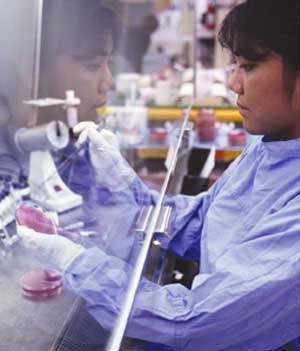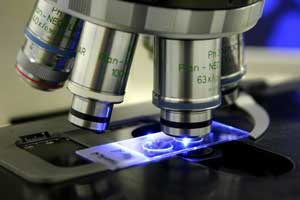Pathologist
Tasks & duties

Pathologists may do some or all of the following:
-
study diseases and conditions of the body
-
diagnose a wide range of diseases such as cancer, infectious diseases and diabetes
-
take samples of body tissue and fluids
-
receive samples from other medical practitioners
-
test samples to find out the nature, development and source of illnesses and conditions
-
make detailed descriptions of samples
-
write detailed reports on the findings of tests
-
provide advice to other medical practitioners
-
identify infectious agents that cause disease; for example, bacteria, viruses (such as HIV) and parasites
-
treat patients directly in some cases
-
investigate deaths and complete autopsies
-
look after a blood bank in a laboratory and facilitate blood collection programmes
-
provide advice on blood transfusion reactions
-
test blood, body fluids and tissue for the presence or levels of drugs
-
manage a medical laboratory
-
direct the activities of a pathology department in a medical school, hospital, clinic or research institute
Specialisations
Pathologists may specialise in the following areas:
Anatomical Pathologist
Anatomical pathologists study organs and tissues to help determine the cause and effect of diseases. They are primarily involved in diagnosing cancers. Subspeciality areas include histopathology, the microscopic examination of tissues taken as biopsy specimens for diagnosis and treatment; and cytology, the study of individual cells to detect abnormal cells.
Chemical Pathologist or Biochemist
Chemical pathologists or biochemists study and investigate the biochemical basis of disease processes, with particular emphasis on metabolic diseases. These include diabetes, bone disease, inborn errors of metabolism and lipid disorders.
Clinical Pathologist
Clinical pathologists cover all areas of pathology, except anatomical and forensic pathology.
Forensic Pathologist
Forensic pathologists investigate unexpected deaths, analyse criminal cases and assist the police in a range of investigations.
General Pathologist
General pathologists cover all areas of pathology.
Genetic Pathologist
Genetic pathologists work in one of the following areas: cytogenetics (microscopic analysis of chromosomal abnormalities), or molecular genetics (using DNA technology to analyse mutations in genes). Genetic pathology involves testing chromosomes and DNA from cells in body fluids and tissues, and diagnosing genetic diseases.
Haematologist
Haematologists deal with diseases that affect the blood, such as anaemia, leukaemia, lymphoma and clotting or bleeding disorders. They can also work in the subspeciality area of transfusion medicine, which involves blood typing and compatibility testing, and the management and supply of a large range of blood products.
Immunopathologist
Immunopathologists deal with immunological tests for allergic reactions, diagnostic markers for autoimmune disorders such as lupus, rheumatoid arthritis, diabetes and thyroid conditions, and tests that monitor tissue injury from inflammation.
Microbiologist
Microbiologists deal with diseases caused by infectious agents, such as bacteria, viruses, fungi and parasites through testing blood, body fluids and tissue samples. They can also work on controlling outbreaks of infectious disease and deal with the problems of infection caused by antibiotic-resistant bacteria.
Skills & knowledge

Pathologists need to have:
-
knowledge of how the human body works
-
knowledge of different diseases and illnesses
-
knowledge of medicines and treatments, and the effect these have on the body
-
knowledge of the chemistry of the body
-
knowledge of anatomy and medical surgical procedures
-
up-to-date understanding of new practices and discoveries in their field
-
analytical and problem-solving skills including the ability to diagnose diseases
-
data analysis skills
-
excellent communication skills
-
report writing skills
Entry requirements
To become a pathologist you need to complete a Bachelor of Medicine and Bachelor of Surgery (MBChB) and spend at least one, preferably two, years as a junior house surgeon in a hospital. You must then complete five years of specialist training and examinations to become a Fellow of the Royal College of Pathologists of Australasia (RCPA).
Pathologists working in chemical pathology, haematology, immunopathology and microbiology may undertake joint training with the Royal Australasian College of Physicians (RACP), and attain joint fellowships of both colleges.
Secondary education
A tertiary entrance qualification is required to enter medical training as the first step. Useful subjects include Bursary or NCEA equivalent biology, maths, chemistry, physics and English.
Training on the job
The training course for pathologists is based on an apprenticeship model, so to study to become a pathologist you must first obtain a training position in a laboratory accredited for training by the Royal College of Pathologists of Australasia.
Once people are qualified pathologists they must keep up to date with research and changes in their field. They must complete a minimum of 100 hours of continuing education each year to maintain professional standards and registration. This can be done through reading approved medical journals, lecturing, and attending conferences or quality assurance programmes run by the Royal College of Pathologists of Australasia.
Registration
Pathologists need to be fellows of the Royal College of Pathologists of Australasia or equivalent, and hold vocational registration with the Medical Council of New Zealand.
Useful experience
Experience in clinical medicine and medical laboratory technology may be useful
Related courses
Human Biology
Laboratory Technology
Medical Science
Pathology
For more information, please refer to Career Services.
Document Actions
